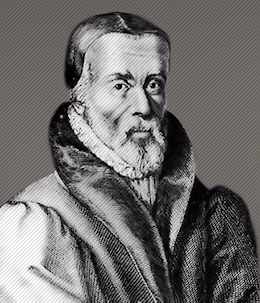Textus Receptus Bibles
William Tyndale Bible 1534
New Testament
| 9:1 | I saye the trueth in Christ and lye not in that wherof my conscience beareth me witnes in the holy gost |
| 9:2 | that I have gret hevynes and continuall sorowe in my hert. |
| 9:3 | For I have wysshed my selfe to be cursed from Christ for my brethren and my kynsmen as pertayninge to the flesshe |
| 9:4 | which are the Israelites. To whom pertayneth the adopcion and the glorie and the covenauntes and the law that was geven and the service of God and the promyses: |
| 9:5 | whose also are the fathers and they of whome (as concernynge the flesshe) Christ came which is God over all thinges blessed for ever Amen. |
| 9:6 | I speake not these thinges as though the wordes of god had take none effecte. For they are not all Israelites which came of Israel: |
| 9:7 | nether are they all chyldren strayght waye because they are the seed of Abraham. But in Isaac shall thy seede be called: |
| 9:8 | that is to saye they which are the chyldren of the flesshe are not the chyldren of god. But the chyldren of promes are counted the seede. |
| 9:9 | For this is a worde of promes aboute this tyme will I come and Sara shall have a sonne. |
| 9:10 | Nether was it so wt her only: but also when Rebecca was with chylde by one I meane by oure father Isaac |
| 9:11 | yeer the chyldren were borne when they had nether done good nether bad: that the purpose of God which is by election myght stonde |
| 9:12 | it was sayde vnto her not by the reason of workes but by grace of ye caller: the elder shall serve the yonger. |
| 9:13 | As it is written: Iacob he loved but Esau he hated. |
| 9:14 | What shall we saye then? is there eny vnrightewesses with God? God forbyd. |
| 9:15 | For he sayth to Moses: I will shewe mercye to who I shewe mercy: and will have compassion on whom I have copassion. |
| 9:16 | So lieth it not then in a mans will or cunnynge but in ye mercye of god. |
| 9:17 | For the scripture sayth vnto Pharao: Even for this same purpose have I stered ye vp to shewe my power on ye and that my name myght be declared thorow out all the worlde. |
| 9:18 | So hath he mercye on whom he will and whom he will he maketh hearde herted. |
| 9:19 | Thou wilt saye then vnto me: why then blameth he vs yet? For who can resist his will? |
| 9:20 | But o man what arte thou which disputest with God? Shall the worke saye to the workeman: why hast thou made me on this fassion? |
| 9:21 | Hath not the potter power over the claye even of the same lompe to make one vessell vnto honoure and a nother vnto dishonoure? |
| 9:22 | Even so God willynge to shewe his wrath and to make his power knowen suffered with longe pacience the vessels of wrath ordeyned to damnacion |
| 9:23 | that he myght declare ye ryches of his glory on the vessels of mercye which he had prepayred vnto glorie: |
| 9:24 | that is to saye vs which he called not of the Iewes only but also of ye gentyls. |
| 9:25 | As he sayth in Osee: I will call them my people which were not my people: and her beloved which was not beloved. |
| 9:26 | And it shall come to passe in the place where it was sayd vnto them ye are not my people: that there shalbe called the chyldren of the lyvynge God. |
| 9:27 | But Esaias cryeth concernynge Israel though the nomber of the chyldren of Israel be as the sonde of the see yet shall a remnaut be saved. |
| 9:28 | He finyssheth the worde verely and maketh it short in ryghtwesses. For a short worde will god make on erth. |
| 9:29 | And as Esaias sayd before: Except the Lorde of sabaoth had left us seede we had bene made as Zodoma and had bene lykened to Gomorra. |
| 9:30 | What shall we saye then? We saye that the gentyls which followed not rightewesnes have overtaken rightewesnes: I meane the rightewesnes which cometh of fayth. |
| 9:31 | But Israel which folowed the lawe of rightewesnes coulde not attayne vnto ye lawe of rightewesnes. |
| 9:32 | And wherfore? Because they sought it not by fath: but as it were by the workes of the lawe. For they have stombled at the stomblynge stone. |
| 9:33 | As it is written: Beholde I put in Syon a stomblynge stone and a rocke which shall make men faule. And none yt beleve on him shalbe a shamed. |

William Tyndale Bible 1534
William Tyndale was the first man to ever print the New Testament in the English language. Tyndale also went on to be the first to translate much of the Old Testament from the original Hebrew into English, but he was executed in 1536 for the "crime" of printing the scriptures in English before he could personally complete the printing of an entire Bible. His friends Myles Coverdale, and John [Thomas Matthew] Rogers, managed to evade arrest and publish entire Bibles in the English language for the first time, and within one year of Tyndale's death. These Bibles were primarily the work of William Tyndale.